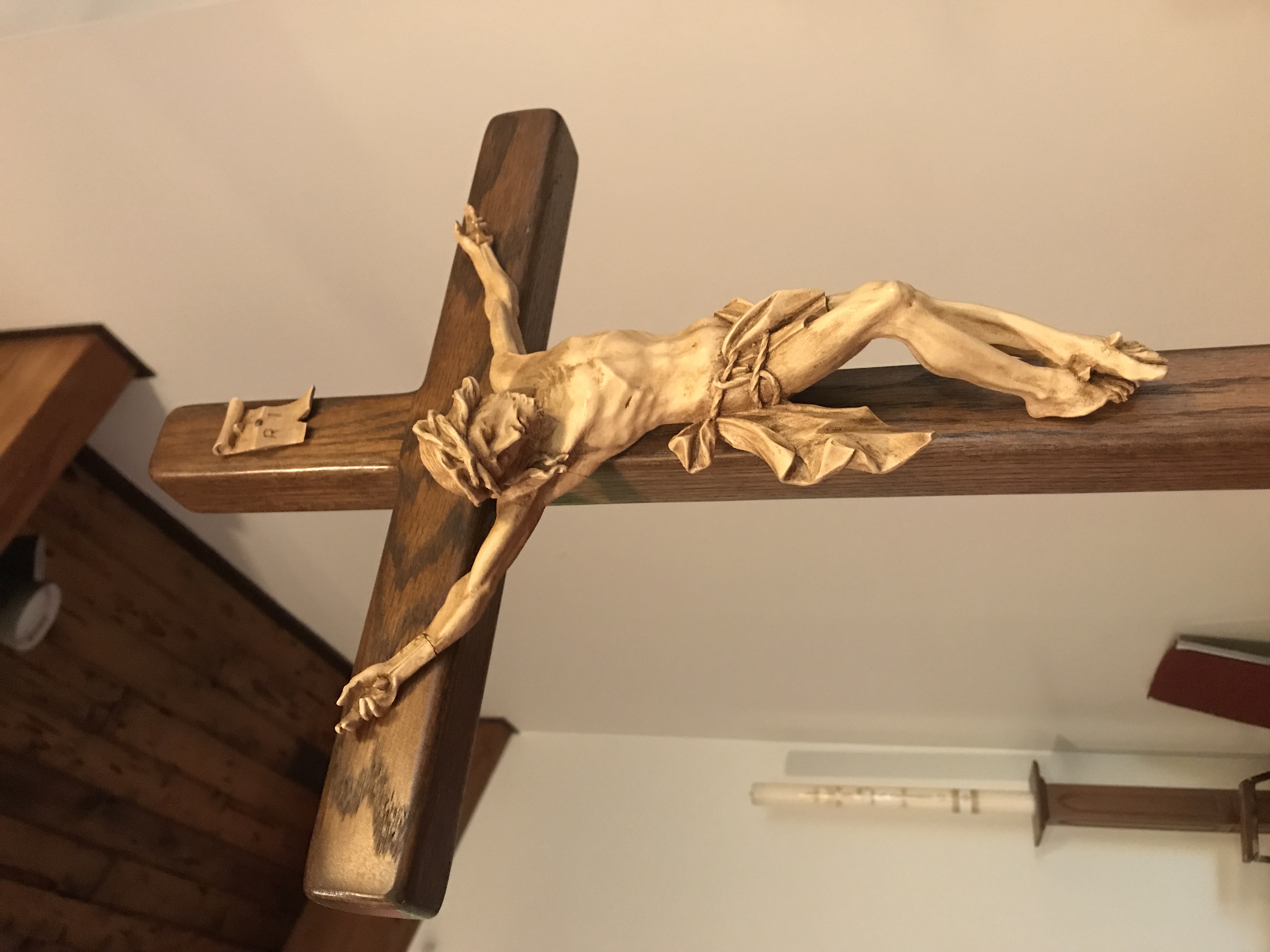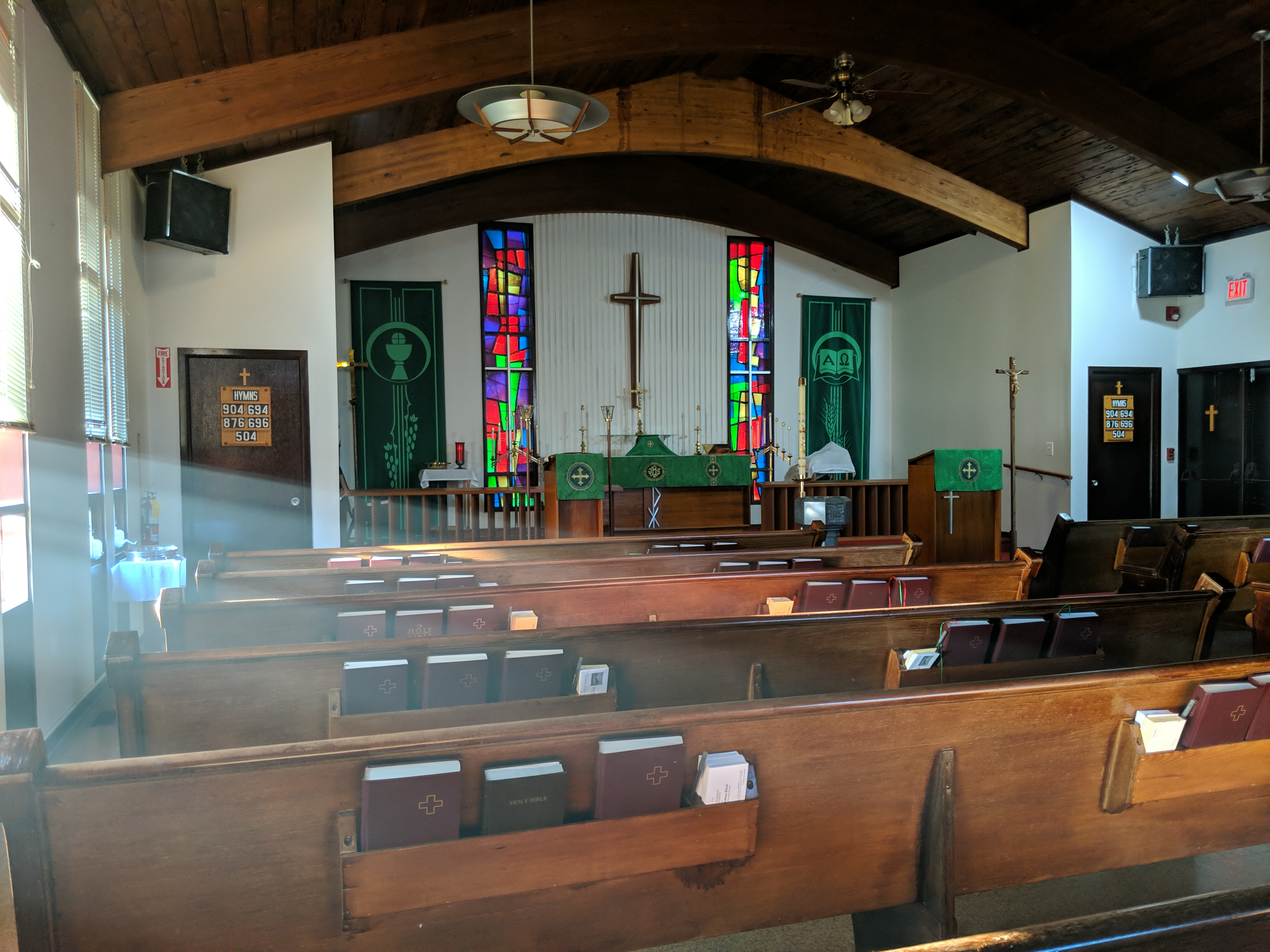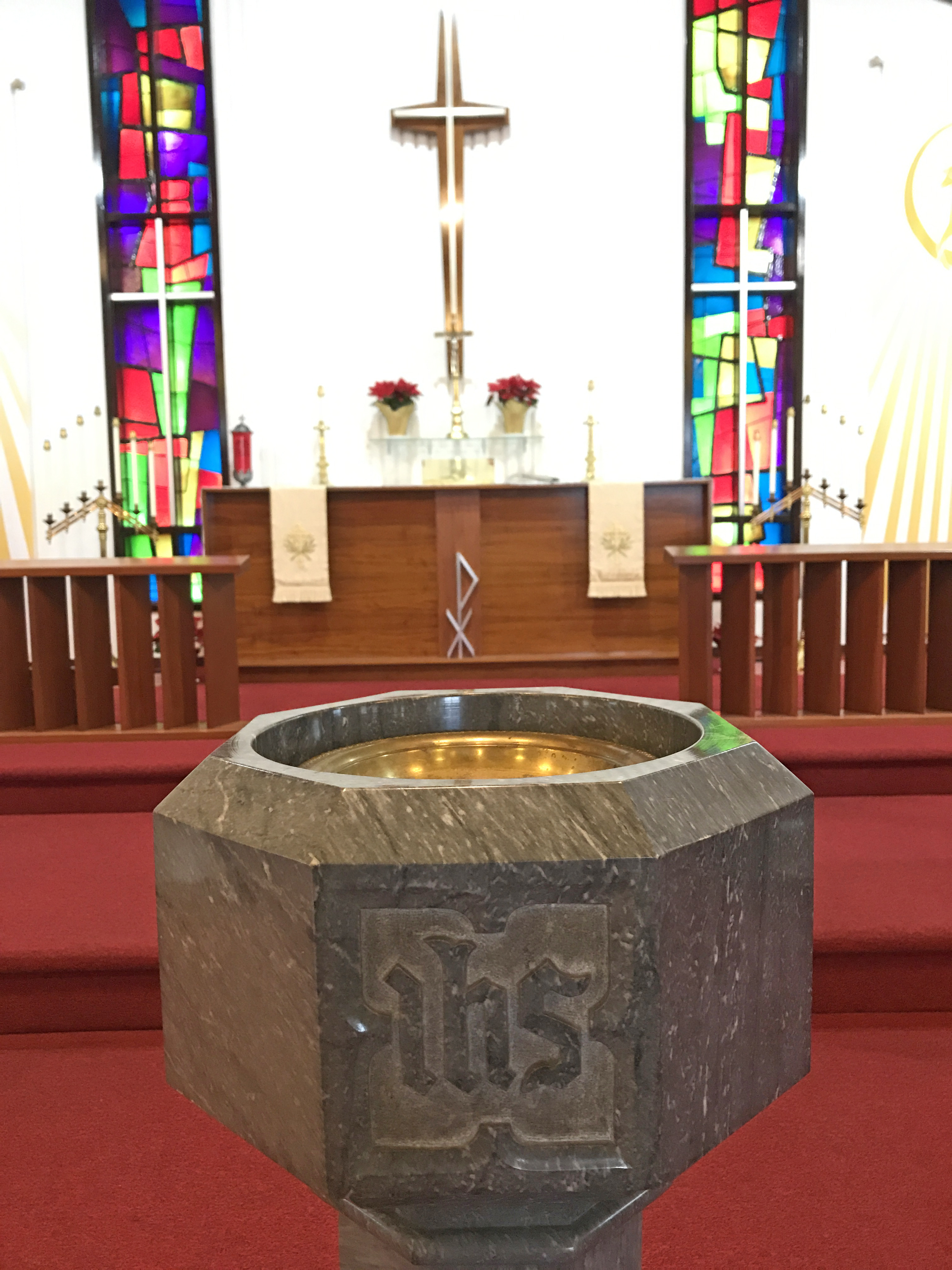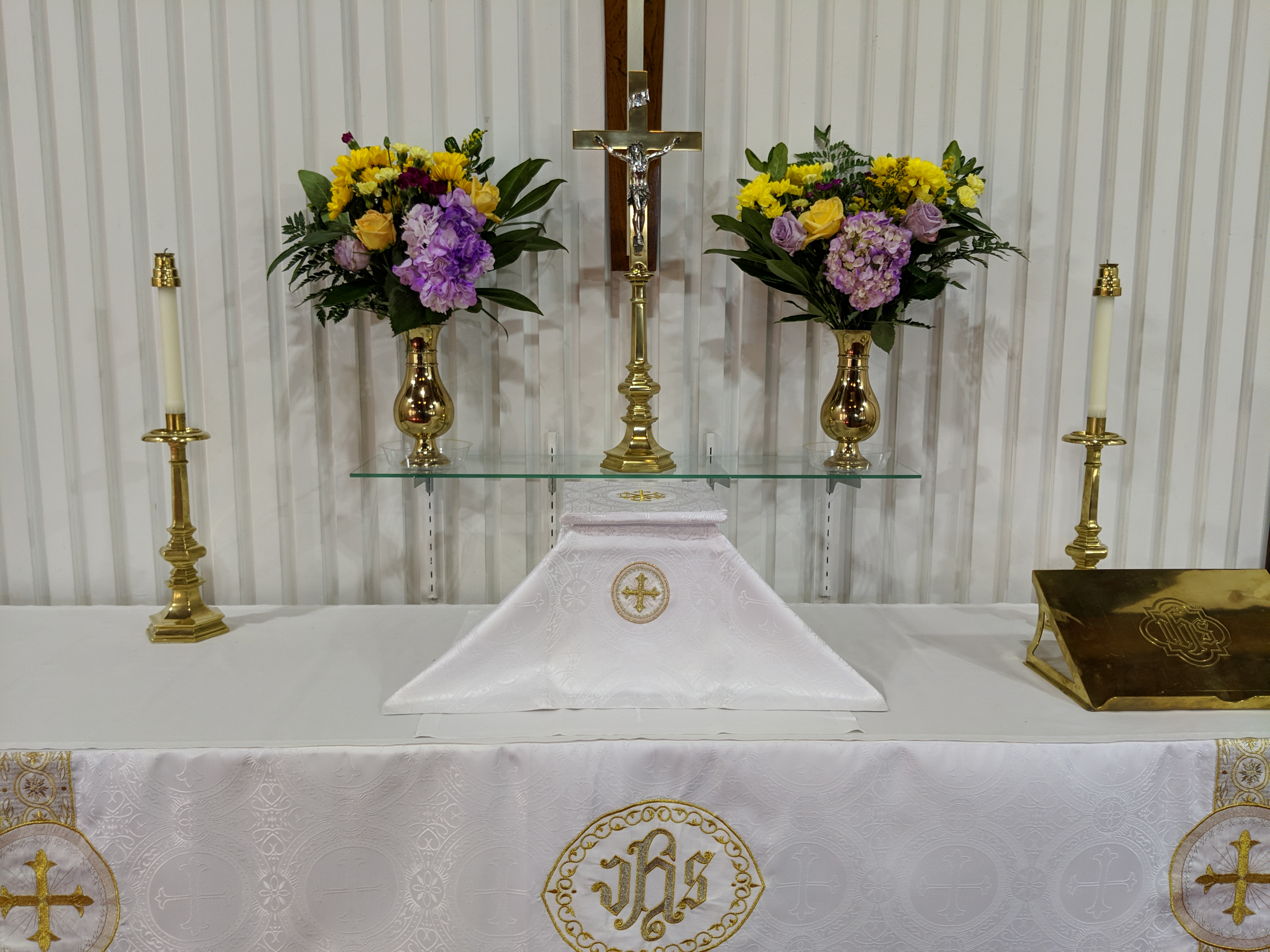Ascension – Thursday 18 May A✠D 2023
✠ Psalmody: Acts 1:11;Psalm 47:1-2, 5;Psalm 47:5;68:18a
✠ Lection: 2 Kings 2:8–15;Acts 1:1–11;St. Mark 16:14–20
Alleluia, Christ is risen! He is risen indeed, Alleluia!
In the Name of the Father and of the ✠ Son and of the Holy Spirit. Amen.
To remember our crucified, risen, and ascended Lord is to remember the blessed Holy Baptism with which He has instituted and gifted to us. The end of St. Mark’s gospel urges our hearts to have faith in that which Christ has done and has given. Our trek through this joyous season had us in the first part of Mark 16 on Easter morning; there at the empty tomb with Mary, Mary, and Salome, trembling, amazed, and fearful. Since then, we have spent all our Sundays in St. John’s Gospel, only to end up right back in Mark 16 40 days later as we see our Lord not only ascend to the Father, but rebuke, teach, comfort, and commission His Disciples before He goes and sends forth the Holy Spirit. We’ll soon get to an interesting detail that connects St. John to this final part of Mark, but first, let us refresh ourselves of what is happening.
In true Markan fashion, chapter 16 is a rapid account of events that carries the urgency that permeates his entire book. In between the Easter and Ascension readings are two brief accounts of Jesus appearing to Mary Magdalene, then to the two disciples on the road to Emmaus with Mark making it clear that neither of these testimonies of the risen Christ were believed by the eleven. So, our text tonight picks up with them gathered as they sat at table, or rather, as they reclined at table, meaning they were together eating. This is significant in the Scriptures, especially in the Gospels, because table fellowship means something, as it still does to this day. Normally, if you gather around a table together for a meal with someone it is because they mean something to you; that y’all have something in common and in that shared commonality, enjoy the provision of the Lord in the gift of daily bread together. It’s an important aspect of Holy Communion, for we as believers in this risen Jesus gather around His table, at His invitation, in His one true confession, and feast on His meal of immortality. We don’t welcome random people with whom we may or may not share this special bond of unity.
Note that those gathered around the table that evening were the eleven. They also had been brought together by one commonality: Jesus. These were His guys, His followers, His Disciples. They were the eleven only because of Him. If it were not for Jesus, these men would never have been together like this. And yet, the very One by Whom they had been gathered was the same One that they all reclined there united, of all things, in unbelief that He had risen from the dead indeed just as He told them that He would. The flesh never wants to believe Jesus. Beloved, do not ever underestimate just how resistant your sinful nature is to every single thing that the Lord says. These were God’s hand-picked Apostles who learned directly from the Word made flesh, yet their unbelief and hardness of heart had to be rebuked. Jesus always speaks directly to our problems so that He may deliver us from them.
The opposite of hardness of heart would be softness of heart, but we may be tempted to say in our day that that sounds a little weak, or maybe even a little too feminine for the strong, manly heart that we want to have to endure the trials of this world. But softness of heart in Jesus’ terms means one that is not hardened with unbelief, but is soft and living in faith, trust, and hope in Him. Dead things dry up and become hard and have nothing to do with life, just like the heart of pharaoh in the Exodus. It is the Lord, and He alone, Who takes such things and breathes life into them; by taking our hearts of stone and giving us soft hearts, hearts of flesh, hearts of life, hearts of belief in Him as our Lord and God, and by putting His own Holy Spirit within us, too. But it is even that good and everlasting redemption to which our flesh resists at every turn. Lord have mercy!
Our dear Lord Jesus doesn’t spend the rest of Mark nagging the Disciples into obedience. It is the goodness of God that leads us to repentance. The Goodness of God appeared to these men in their unbelief and He showed them that the Gospel is true; that Jesus lives! Alleluia, Christ is risen! He is risen indeed, Alleluia! And not only was the Good News for them so that their unbelief turned into trust and their fear into joy, it was given to them in turn to give to the whole world, and lo and behold, it has made it that far here to us over great distance of space and time so that our hearts remain not hard as well. It’s all because Jesus speaks, He institutes, He forgives, He raises from the dead lifeless sinners and those new hearts that they possess now bear the testimony for others to hear this same saving grace. Christ’s Holy Word and Baptism is for everyone so as to bring about saving faith and belief in His Holy Name, for He is The One Who has wrought salvation for the whole world. Therefore, He tells them, “Go into all the world and preach the gospel to every creature. He who believes and is baptized will be saved; but he who does not believe will be condemned.”
That great declaration is for the hearts of all believers, not just soon-to-be or recent confirmands, because those are the words of Jesus proclaiming to you what He has done and How He delivers His salvation to you. Now, there are many signs spoken about in this small portion of the Scriptures’ shortest Gospel. We hear of exorcism, speaking in tongues, serpent handling, poison drinking, and healing the sick. There are some proclaiming the name of Jesus in our day who would say that these signs are to accompany us in the modern Church. Could the Lord do them among us now if He so desires? Indeed, but we’re not going to test Him, mostly because of the very last verse in this Gospel: “And they (the Apostles) went out and preached everywhere,” thus fulfilling Christ’s earlier command to do just that. And as they were going out, they carried with them the fulfillment of Christ’s promise by “the Lord working with them (again, the Apostles) and confirming the word through the accompanying signs.” They were building the New Testament Church on this Rock, which is Christ.
So, Jesus said, “In My Name they will cast out demons.” Sts. Philip and Paul are two examples in the Book of Acts who did this. “They will speak with new tongues.” This was fulfilled at Pentecost when the Apostles proclaimed Christ in languages unknown to them to devout men dwelling in Jerusalem from every nation under heaven. “They will take up serpents.” Remember the viper that latched onto Paul’s hand on the island of Malta. He shook it off into the fire and the natives sat around waiting for him to die. He didn’t. But they ended up getting the sign wrong because it caused them to believe that Paul was a god, not that He came bearing the Good News about the one true God. Also, “if they drink anything deadly, it will by no means hurt them.” Let’s finish the list and come back to this one. “They will lay hands on the sick, and they will recover.” The healing of serious ailments, and even death, is prevalent in the words of the Acts of the Apostles as multitudes were being brought to them for healing. These signs were fulfilled in these men and in their Apostolic Ministry.
Now, regarding the prophecy “if they drink anything deadly,” I want to tell you about one of the recent conferences I attended. The one in Fort Wayne was at Redeemer Lutheran Church and inlaid in their beautiful hardwood pulpit are golden statues of Jesus central and the four Gospel writers, two flanked to either side of Him. There are Sts. Matthew, Mark, Luke, and John, each standing with a quill and a scroll in hand. But St. John holds those two things in his right hand while in his left is a chalice with a serpent rising out of it. I had no idea what it meant, but it’s connected to this text. Although there is much, mostly friendly, debate on the dates of when each Gospel was written, I do believe that John’s was the last of all, meaning that he would’ve both heard Jesus speak these prophecies in person and would’ve been comforted by those promises being written by St. Mark and available for the strengthening of even his faith as an apostle going out.
Tradition holds that St. John was given deadly poison to drink, but that it did not harm him, similar to how he was attempted to be martyred with boiling oil, but survived that, too. So, not only on the pulpit at Redeemer Lutheran Church, but throughout the history of Christian art has St. John often been depicted as holding a chalice with a snake coming out of it symbolizing the deadly thing that he drank that did not harm him. All these signs simply confirm that Jesus is the Truth and that His Word proclaimed by His apostles and now in His Holy Church is true.
There is another sign in this text for us to consider more deeply than these minor ones, for they all were given to point us to the major one that Christ mentions and institutes: the sign of Holy Baptism. All of the others have the purpose of simply confirming the Apostolic teaching. But the sign of Holy Baptism is given for all, throughout all ages until Christ’s return. It does something. By it, God does something. Baptism works forgiveness of sins, rescues from death and the devil, and gives eternal salvation to all who believe this, as the words and promises of God declare in Mark 16:16: Whoever believes and is baptized will be saved, but whoever does not believe will be condemned. The everlasting benefits of Christ’s life, death, resurrection, and ascension are poured on you in your Baptism. It is God’s means of grace by which the salvation of Jesus Christ is given directly to you. Such a mighty sign it is, because all the accompanying signs are just like those in Jesus’ earthly ministry: they themselves restored what was broken by sin but for a moment in time. We love those signs not nor do we need them. Baptism now saves you, meaning that it is the eternal gift of God by which you are buried with Christ into death and raised again. Therefore, remember Christ; His death; His resurrection; His ascension; His baptism of you, for it is eternally by far, the greater sign.
In ✠ Jesus’ Name. Amen.















Comments are closed, but trackbacks and pingbacks are open.